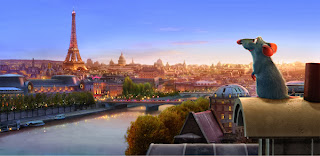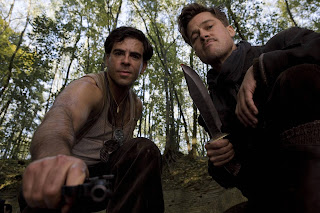Running time: 130 minutes
Certificate: U
Language: English
Screenplay: Frances Goodrich, Albert Hackett, Frank Capra
Director: Frank Capra
Starring: James Stewart, Donna Reed, Lionel Barrymore, Thomas Mitchell, Henry Travers, Frank Faylen, Ward Bond
 |
| George finds that it really is a wonderful life. |
George Bailey (James Stewart) lives in the small town of Bedford Falls. Although he's always wanted to travel, he's never managed to lift himself out of his place at the head of a small struggling savings & loan company, a legacy left to him by his father. While failing to leave Bedford Falls, George meets, falls in love with, and starts a family with Mary Hatch (Donna Reed). George's little business is in constant danger of being swallowed up by the greedy and unpleasant Henry F. Potter (Lionel Barrymore), who already owns much of Bedford Falls and has designs on the rest. When George's uncle Billy (Thomas Mitchell) misplaces $8,000 of the business's money one Christmas, which is found and hidden by Potter, it looks like that may finally happen. More than that, George is likely to end up in prison over the loss. This coupled with a number of other things cause him to momentarily forget he has a loving family and many friends and leads him to contemplate ending his own life. Standing on a bridge over running water, psyching himself up to jump, he notices another person fall in. Being the kind of man he is, previous thoughts of suicide dissolve, and George launches himself from the bridge and rescues who turns out to be Clarence, his guardian angel (Henry Travers). To bring George to his senses, Clarence shows him what Bedford Falls would have been like if he’d never been born.
It’s ironic that the climax of a film so uplifting could be centred around one man’s attempt to commit suicide, but it is easy to forget that this is only the climax. What has gone before has moments of incredible beauty and light-hearted comedy and can't help but touch a cord in even the most unemotional person. Frankly, if this film doesn't fill you with warm gooey love, you are dead inside. The legendary Jimmy Stewart imbues George with such a gentle spirit, and such passion and warmth, that you cannot want anything but a happy ending for him. There's some indefinable magic about Stewart, and number of other actors from his generation (Fred Astaire, Humphrey Bogart, Rita Hayworth, Audrey Hepburn and others) - watching them is like crack for the soul.
While George is being driven to the realisation that his life is wonderful and important, you can't help but be reminded that you, the viewer, are also important. You effect the people and the world around you in unseen ways. You matter to others, and coming to that realisation, or being reminded of it is a boost that's a hell of a lot cheaper than six months of therapy. Sometimes you need a little lift and this story about coming together for the people you love in their time of need delivers in spades.
Score: 9/10
Unlike when it was first released, this movie is met with pretty much universal love out there - see these reviews by James and Laurie.
 |
| Clarence works hard to show George that he matters more than he thinks. |
While George is being driven to the realisation that his life is wonderful and important, you can't help but be reminded that you, the viewer, are also important. You effect the people and the world around you in unseen ways. You matter to others, and coming to that realisation, or being reminded of it is a boost that's a hell of a lot cheaper than six months of therapy. Sometimes you need a little lift and this story about coming together for the people you love in their time of need delivers in spades.
Score: 9/10
Unlike when it was first released, this movie is met with pretty much universal love out there - see these reviews by James and Laurie.























